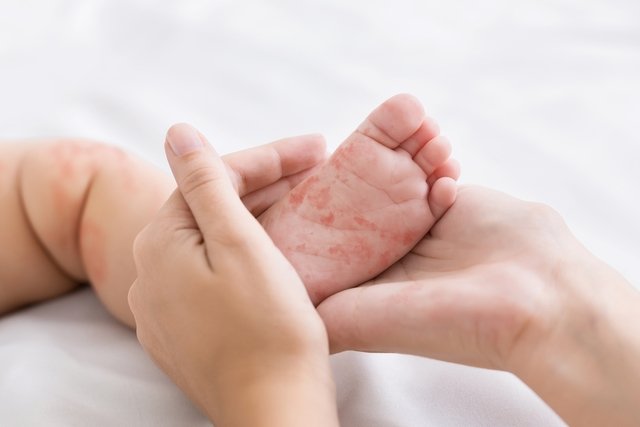Measles treatment consists of symptom management through rest, hydration and medications like acetaminophen. Treatment typically lasts for around 10 days, which is about how long the infection lasts.
Measles is more common in children and its treatment is aimed at relieving uncomfortable symptoms such as fever, general malaise, lack of appetite, itching and red spots on the skin that can develop into small wounds. Learn more about the symptoms of measles and check-out our online symptoms quiz to determine your risk for this infection.
Measles is a highly contagious disease that is transmitted through droplets of saliva that spread through the air. The risk for transmission is highest when the red spots appear on the skin.

Treatment options
There is no specific medical treatment to eliminate the measles virus, and therefore treatment is aimed at relieving symptoms and supporting the immune system. Treatment options may include:
1. Rest and hydration
You should get lots of rest and drink plenty of fluids to support your body during recovery to fight off the virus. You can consume fluids as water, tea or coconut water to promote optimal bodily functions and prevent dehydration.
2. Taking medications
The doctor may prescribe medication to relieve fever and pain, like acetaminophen and ibuprofen. You should not take any medications with acetylsalicylic acid, due to the already increased risk for bleeding associated with measles.
Vitamin A supplementation may be beneficial for children with measles as it reduces the risk of death. It is prescribed if bloodwork confirms a deficiency or if the mortality rate due to measles is high. The dose must be taken and repeated after 24 hours, and again after 4 weeks.
Antibiotics are not indicated for the treatment of measles, as this infection is associated with a viral infection and not a bacterial infection. However, the doctor may prescribe them if a bacterial infection develop as a result of lower immunity.
3. Cold compresses
Measles can cause conjunctivitis and the eyes can become red and very sensitive to light. It can also lead to copious eye discharge.To improve these signs and symptoms, you can clean your eyes with a cold compress soaked in saline whenever and wearing sunglasses, even at home.
Cold compresses can also be useful to reduce fever. Place a cloth soaked in cool water on the forehead, back of the neck or armpits to naturally reduce the body temperature.
4. Moisturizing the air
To thin out secretions and facilitate their removal, the air can be humidified by placing a bowl of water in the room. This can also reduce throat irritation and discomfort. A persistent cough from dry air can also be treated with cough syrups, like loratadine.
Treatment duration
The duration of measles is approximately 8 to 14 days, but in most individuals it lasts 10 days. Four days before the first symptoms of the disease appear, the individual can infect others. This is why vaccination is so important, as preventing transmission is very difficult.
Possible complications
Measles is a self-limited disease that generally does not cause complications, however, in rare cases, measles can lead to:
- Bacterial infections such as pneumonia or otitis media;
- Bruises or spontaneous bleeding, as the number of platelets can decrease significantly;
- Encephalitis, a type of brain infection;
- Subacute sclerosing panencephalitis, a serious complication of measles that produces brain damage.
These measles complications are more common in individuals who are malnourished or have some compromised immune system.
How to prevent getting measles
The best way to prevent a measles infection is to get vaccinated. It is usually given at 12 months of age, with a booster dose given at around 5 year old. However, the vaccine can be given to anyone who has not been vaccinated.
Anyone who has had the measles vaccine is protected for life and does not need to worry if they are exposed. However, anyone who has not yet been vaccinated can become infected and therefore should stay away from infected people and immediately take the vaccine at a health center.
When to see a doctor
You should see a doctor if you experience symptoms such as:
- Fever above 40ºC (about 104ºF) due to an increased risk of seizures t
- Vomiting due to excessive coughing
- Signs of dehydration such as sunken eyes, very dry skin, crying without tears and reduced urine output
- If you are unable to drink fluids
These signs may indicate that the condition has worsened, requiring further assessment, and possible hospitalization for IV fluids.
Rarely does a person with measles experience complications, but these can arise if they have a very weak immune system or if the virus reaches the brain, for example (which is not common).
